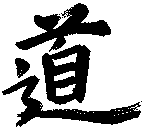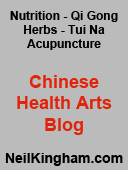 |
Taoism And The Taoist Arts |
||||
Taoist Medicine & Diet |
|||||
Background & History: The Taoist Arts: |
Chinese Medicine Traditional Chinese Medicine (TCM) is a holistic form of treatment, meaning that it looks at the whole body and the mind of the patient, and attempts to treat the cause rather than the symptoms of the disease. It seeks to determine why a disease or disorder has come about, and remedy the problem from the root. Where Western medicine looks for specific diseases, and uses the same treatment for each occurrence of that disease, TCM is more concerned with the patterns of disharmony unique to the individual, and may treat a disease differently for each person. To a practitioner of Western medicine the physical is of prime importance - disease is a collection of (usually physical) symptoms and removal of those symptoms is considered a cure. With Holistic medicine such as TCM symptoms
on any level (physical, mental, emotional, spiritual) are seen as reflections
of an internal imbalance - treatment is aimed at curing the disease from an
energetic viewpoint, rather than just suppresing the symptoms. This approach
necessitates highly specialised diagnosis methods in order to discern the state
of all the bodily systems to a high degree of accuracy, and a TCM practitioner
will usually spend a great deal of time on careful diagnosis. This approach
has proved extremely effective in many diseases that have stumped Western medicine,
for instance eczema, asthma, migraine and other long term, recurring problems.
In China a person will go to either a Western doctor or a traditional doctor depending on their problem - the Western approach tends to be invasive, and favours surgery and drugs. It looks at bodily systems individually and aims treatment at only that system. It is often of great use in life threatening problems. Problems arise when symptoms are suppressed with powerful drugs or surgery, but the energetic imbalance remains, and when this happens the imbalance manifests again at a later date in a different, often more serious, way. The Eastern system in comparison favours non-invasive methods, looks at all the bodily systems and treats them all together, and aims to prevent rather than treat illness. It is often of great use with long term illness where a bodily imbalance is indicated. Whatever the treatment method that is used, the aim is the same – to restore balance and harmony to the body. The Chinese view of disease is that it indicates an imbalance in the bodily systems. There is little notion of cause and effect, instead the TCM practitioner will look for patterns of disharmony, and see all symptoms as inter-related. Nor are the physical, mental or spiritual aspects of life separated, they are all considered together and seen to influence each other closely. This approach is seen in the descriptions used by Chinese physicians for the organs. Where the West is interested in the exact physical location and structure of each organ (vital information for surgery), the TCM description of the organs does not overly concern itself with the exact whereabouts of the organ but focuses on the functions that it performs and the relationships it has with other organs and with the Chi and Blood and how it relates to the five elements theory. This means that some organs known to the west are not recognized by TCM (eg the pancreas) and vice versa (for instance, the Triple Heater.) This is not to say that one system is wrong, or better than the other, but fundamentally different approaches are being used. This is why it is hopeless to apply techniques or assumptions from one system onto the other. Chinese Nutrition We have too much alcohol, acid and fat, and naturally our health suffers. As one system is upset it affects other processes in the body and the entire balance can be thrown. Persistent abuse can lead to a build up in toxins and a gradually reduced immune system, bad digestion, headaches, back pain, spots and other more serious problems. As diet is considered one of the major elements of health Chinese doctors will often use the yin/yang and 5 elements theories to recommend diet changes if the patient's intake is unbalanced. The cliche 'you are what you eat' sums up this approach perfectly. The body is constantly repairing and renewing itself - in fact, in 10 years time you will retain not a single cell of your current body, they will all have been replaced. This applies to your skin, organs, brain, bones and every part of the body. It doesn't take much intelligence to realise that the fuel for this process, and the very building blocks of the physical body come from our food, so we really are what we eat. Taoist Dietary Advice
Additionally it recommends avoiding food which is hard to digest (e.g. dairy products and red meat) and anything acidic which upsets the delicate balance of the stomach (e.g. citrus fruits). The final recommendation is to eat the food nature intended us to eat by opting for locally grown season produce whenever possible. It also follows that organic is best, as organically grown food contains no artificial chemicals and causes less harm to the environment. These simple guidelines dispense with the need to count calories or fat levels, or to worry about deficiencies. By eating a varied diet with lots of whole grains, seeds, nuts and seasonal fruit and vegetables you get everything you need for a healthy body and mind. After all, we are a part of the natural world, and have evolved to eat the foods that grow around us. Everything we need is readily available to us without the need to rely on man-made additives and chemicals. Note that these recommendations should not be followed in conjunction with other types of diet, and anyone with a serious health problem should always consult their a doctor or a Chinese nutritionist before undergoing a change of diet. Basic guidelines:
Acupuncture By inserting needles into the skin at certain specified points the acupuncturist seeks to slow or encourage the flow of chi in certain areas, thereby restoring balance within the body. The system used is complicated and very detailed, and the number of acupuncture points immense. This huge body of knowledge was built up gradually over thousands of years by Taoists using a scientific approach of systematic trial and error, often tested on each other or themselves! This form of treatment is now generally accepted by Western medical practitioners, but has been used in China and other Eastern countries for many thousands of years. It is worth noting that the acupuncture often carried out by Western Medical Professionals is usually not the same as that carried out by those trained in the Chinese tradition - when seeking acupuncture treatment always ask the acupuncturist what training they have received. When acupucture is used by Western practicioners it tends to be solely for the purposes of pain relief and lacks the deeper understanding of a Chinese trained acupuncturist. Tui Na (Chinese Massage) Tui Na is the least known of the branches of Chinese medicine. It is a kind of body work, combining massage techniques and acupressure. It is very wide in its scope, and can treat a range of internal and external conditions. Yin style Tui Na is a gentle, light treatment, working primarily with the Qi. Yang style Tui Na is deeper and stronger, and is very effective at working tension and knots from muscles. In practice, yin and Yang styles are often used together.
Food : Your Miracle Medicine by Jean Carper. A Western guide, full of information backed up by scientific studies. A very useful reference book. The Yellow Emperor's Medicine Classic (Nei Ching) by Iiza Veith (trans.)The classic text on Chinese Medicine, still in use today. A highly detailed text that contains everything you might need to know about Chinese Medical Theory. An excellent guide, but heavy going, and not recommended for the beginner! (Click here for UK info) The Organic Bible by Bob Flowerdew. A superb introduction to organic gardening, with a good explanation of organic principles and detailed information on how to go about putting them into practice yourself. (Click here for UK info)
|
||||
|
|
|||||


 "To Western medicine, understanding an illness means
uncovering a distinct entity that is seperate from the patient's being; to Chinese
medicine understanding means perceiving the relationship's between all the patient's
signs and symptoms in the context of his or her life."
"To Western medicine, understanding an illness means
uncovering a distinct entity that is seperate from the patient's being; to Chinese
medicine understanding means perceiving the relationship's between all the patient's
signs and symptoms in the context of his or her life." The Taoist diet
is based on simple rules, one of the most important being 'eat only food' -
this means avoiding unnatural foods that the body cannot process (artificial
additives, drugs etc.) and heavily processed foods that contain little or no
nutritional value (white flour, sugar etc.) These are not things that the body
is designed to consume, so are not really 'foods' fit for human consumption.
The Taoist diet
is based on simple rules, one of the most important being 'eat only food' -
this means avoiding unnatural foods that the body cannot process (artificial
additives, drugs etc.) and heavily processed foods that contain little or no
nutritional value (white flour, sugar etc.) These are not things that the body
is designed to consume, so are not really 'foods' fit for human consumption.